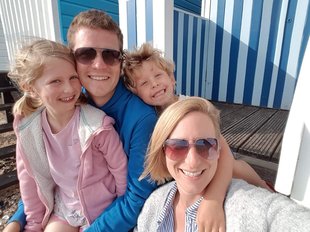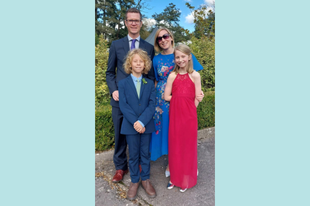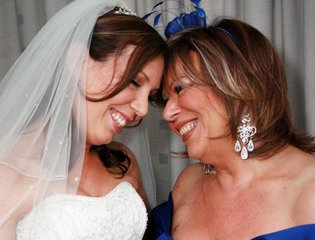Talya: After removing my ovaries I can definitely feel the difference in my body but don't regret the choice.

Tayla and her family
People of Ashkenazi Jewish heritage are ten times more likely to carry a BRCA gene fault that heightens a person’s risk of certain cancers, including ovarian. Talya shares her story in the hope that more Jewish families can stay together, for longer.
I was not surprised when I discovered I had a BRCA2 gene fault. Actually, it was a complete and utter relief to be told the news because I knew I had the option to reduce my risk of cancer. My mum didn’t have that choice. She passed away when I was 14. She was just 45.
After her death, I lived with the feeling that cancer was coming for me. It didn’t keep me awake at night but it was there at the back of my mind. I remember talking to my husband - quite early in our relationship - about my desire to have a family but how concerned I was that I would not be around to see my children grow up. I didn’t want to miss out on their lives, like my mum had with us, or leave him to raise them by himself, alongside the devastation of losing a parent to cancer - a pain that I’ve now been through twice.
My mother’s first cousin in Israel had mentioned ‘BRCA’ to me a number of times after her own cancer experience had led to her finding out she carried a BRCA2 gene fault. In Israel, genetic testing is very advanced. Her study of the family revealed a large cancer history on my mother’s side; in fact four of my grandfather’s siblings, and a number of his immediate cousins, had developed one of the BRCA2 related high-risk cancers. People with Ashkenazi Jewish heritage are ten times more likely to carry a BRCA gene fault, which increases the likelihood of ovarian, breast and prostate cancer. Carriers have a 50% chance of passing it on to their child. And yet, even today, very few know anything about faulty BRCA genes.
Throughout my twenties I had a number of breast cancer scares. I was very lucky as they were always negative but I was terrified that one day I wouldn’t be. I asked my breast consultant about this thing called ‘BRCA’ but was told that it wasn’t relevant to me. It wasn’t until after my second child was born that my GP looked at my family history and asked whether I’d like to go for genetic testing. From there it was easy: I agreed, met a fantastic genetics counsellor and took the very simple blood test. The result came quickly and confirmed I carried a BRCA2 gene fault.
TalyaThe more we talk openly about faulty BRCA genes, the more people will realise that they have this option to find out about their cancer risks.
After this I was given access to regular mammograms and ultrasounds. I had the support to make informed decisions about my health and I knew immediately that I wanted risk reducing surgery. In 2018, I had a double mastectomy. I woke from surgery laughing. My husband claimed it was the drugs; but, I remember just feeling so relieved that my breast cancer risk had been almost entirely removed. In the near future I will have my ovaries removed too, to reduce my risk of ovarian cancer.
Genetic testing has allowed me to take control of something I’d previously had no control over. In my opinion, knowledge is power and the more we talk openly about faulty BRCA genes, the more people will realise that they have this option to find out about their cancer risks.
2025 update:
Since I first shared my story, a few things have happened.
We moved to a different part of the country in 2022 and it took a while to get re-set up with a new gynaecologist, who would see me to discuss my next BRCA2 steps. I saw one who suggested I have a hysterectomy as well as my ovaries out but thankfully, I met with another who understood womb cancer was not related to my BRCA2 gene fault and so a full hysterectomy was unnecessary.

Talya and her family
In April 2024 I had a bilateral salpingo-oophorectomy (removal of fallopian tubes and ovaries) to reduce my ovarian cancer risk. This put me straight into menopause and I went onto HRT right away. I can definitely feel the difference in my body but don't regret the choice.
I'm not sure I have advice for someone awaiting an oophorectomy. I made sure I asked as many questions as I could beforehand especially about HRT. And I made sure I could start it straight away. Don't be scared to try a different HRT if the first doesn't work for you. I also had a really wonderful gynaecologist who put my mind at ease. I think the positive of the surgery definitely outweighed the risks of not having it and it's a huge relief to have had all the surgeries. Onwards and upwards.
I'm beginning to notice a change/hardening in one of my implants and so I am considering how long it will be before this change leads me to an implant replacement. I'm not worried about it though.
Apart from that, in December 2023 I splashed out and got myself a tattoo to celebrate one side of my mastectomy scar! I love it.
Did you know that through the NHS Jewish BRCA Testing Programme, adults in England with one or more Jewish grandparent are eligible for free BRCA testing. Click here to find out more


